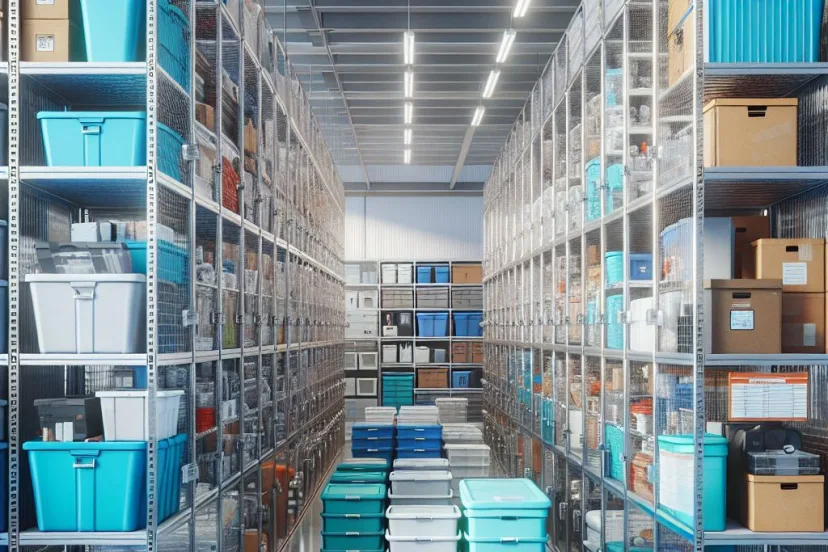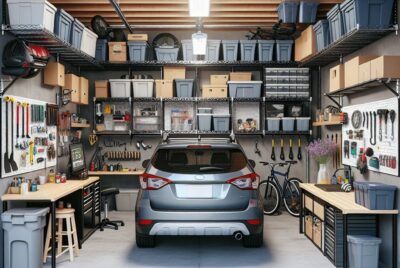Affordable Self-Storage Units: Maximize Space & Top Savings
Key Takeaways
- Assess your storage needs to choose the right unit size and avoid paying for unused space.
- Compare storage facilities based on price, location, amenities, and security features.
- Organize your storage unit efficiently to make the most of the space you rent.
- Look for flexible lease agreements to save money in the long run.
- Take advantage of off-peak periods, shared spaces, and discounts to further reduce costs.
Finding the Right Size: Don’t Pay for Empty Space
One of the simplest ways to save on self-storage is to choose the right unit size. Renting a unit that’s too large for your needs means you’re throwing money away on space you’re not using. But how do you determine the perfect size?
Choosing the Right Unit for Your Needs
Start by taking inventory of the items you plan to store. Group them into categories and list them out. This will give you a visual representation of the quantity and help you estimate the size of the unit you’ll need. Remember, it’s better to choose a unit that’s a little too small than one that’s too large, you can always get creative with storage solutions to fit everything in.
Calculating Space Requirements
Measure your largest items and use those dimensions as a baseline for the minimum space you’ll need. Then, consider how stackable your belongings are. Boxes and furniture that can be safely stacked will require less floor space. Use online tools or calculators provided by storage facilities to estimate the unit size that would best fit your belongings.
Comparing Facilities: More Than Just Price
It’s tempting to go with the cheapest option, but the lowest price doesn’t always equate to the best value. When comparing self-storage facilities, consider a variety of factors beyond cost.
Location and Accessibility
Convenience is key. A facility that’s closer to your home or workplace may be worth a slightly higher price due to the savings in time and transportation costs. Also, consider the facility’s access hours. If you need to get to your belongings frequently, you’ll want a place that offers extended or 24-hour access.
Amenities and Security Features
Security is non-negotiable. Look for facilities with robust security measures like gated access, surveillance cameras, and individual alarms for units. Additionally, consider the amenities offered, such as climate-controlled units if you’re storing sensitive items, or drive-up access for heavy and bulky items.

“Innisfil Self Storage …” from www.innisfilselfstorage.com
Organization Tricks: Get More Bang for Your Buck
Once you’ve secured your unit, the next step is to maximize every square inch. The secret? Organization. By being smart about how you pack and arrange your items, you can fit more than you think into a smaller, more affordable space.
Maximizing Vertical Space
Think upwards! Many people forget that storage units have height to them, not just floor space. Invest in sturdy shelving units to take advantage of this. Place heavier items on the bottom and lighter ones on top. This way, you’re using the full volume of the unit and not just the floor area.
Using the Right Packing Materials
Quality packing materials can save you space and money in the long run. Use stackable plastic bins instead of cardboard boxes—they’re more durable, uniform in size, and protect against moisture. Label everything clearly, so you can find what you need quickly without having to move everything around. For more insights, check out these 7 tips for saving money on self storage units.
Contract Know-How: Flexibility Equals Savings
When it comes to the lease agreement for your storage unit, flexibility can lead to significant savings. Understanding the terms and conditions of your contract can help you avoid hidden fees and penalties.
Understanding Lease Agreements
Read the fine print. Look for clauses about notice periods for moving out, late payment fees, and any restrictions on what you can store. Knowing these details will help you plan better and avoid unexpected charges.
Negotiating Terms to Benefit Your Wallet
Don’t be afraid to negotiate the terms of your storage unit lease. Some facilities may be willing to offer a discount if you commit to a longer rental period or pay a few months upfront. It’s all about the art of the deal, and the worst they can say is no. For more insights on securing your belongings, check out the best locks for storage units.
Timing is Everything: Off-Peak Deals
Storage unit prices can fluctuate based on demand. Typically, demand peaks during transitions like the beginning or end of the month when people are moving. Plan your rental for mid-month or during slower seasons to snag a better deal.
Seasonal Discounts and Offers
Keep an eye out for seasonal promotions. Many storage facilities run special offers during holidays or the off-season to attract customers. This could be a perfect time to lock in a lower rate.
Long-Term vs. Short-Term Rentals
Consider how long you’ll need the storage unit. Opting for a longer-term rental agreement can often reduce the monthly cost. Facilities prefer the security of a long-term tenant and may offer discounts as an incentive.
Shared Spaces: Halve Your Costs
Sharing a storage unit with a friend or family member can cut your costs significantly. It’s a great strategy for those with fewer items who don’t need an entire unit to themselves.

Teaming Up: The Pros and Cons
Before jumping into a shared storage agreement, weigh the pros and cons. It’s a fantastic way to save money, but it requires clear communication and trust. Make sure you’re both on the same page about what’s being stored and how bills are split.
- Discuss and agree upon what items will be stored.
- Determine how the space will be divided.
- Set up a payment plan that works for both parties.
Remember, when you share a space, you’re also sharing responsibility. Ensure both parties understand the terms of the lease and the facility’s rules.
Setting Ground Rules with Storage Partners
Set clear ground rules from the start. Decide on who has access to the unit, how often you’ll check on your belongings, and what the protocol is for removing or adding items. This will help avoid any misunderstandings and keep the partnership running smoothly.
Discounts and Promotions: Don’t Miss Out
Last but not least, always be on the lookout for discounts and promotions. Storage facilities often offer special deals to new customers, such as the first month free or discounted rates for prepaying several months in advance.
Check the facility’s website, sign up for their newsletters, and follow them on social media to stay informed about current promotions. It’s a small effort that could lead to big savings.
By following these tips, you’ll be well on your way to finding an affordable self-storage unit that doesn’t skimp on quality or security. With a little planning and savvy, you can store your belongings without breaking the bank.
Online Deals and Digital Coupons
Scouring the internet for online deals and digital coupons can lead to substantial savings when renting a storage unit. Many storage companies offer exclusive online rates that are lower than their standard prices. By booking your unit online, you could unlock discounts that aren’t available in person.
Before you commit to a rental, do a quick search for coupons or promo codes. Some storage companies partner with websites that specialize in digital coupons, providing an easy way to save extra cash with just a few clicks. Remember, the few minutes you spend searching for these deals can shave a considerable amount off your monthly rental fee.
Loyalty Rewards and Referral Bonuses
Another avenue for savings is through loyalty rewards and referral bonuses. If you’re a long-term customer at a storage facility, ask about any loyalty programs they may offer. These can include discounts on future rentals or even free months of storage after a certain period of loyalty. Besides that, many storage companies offer referral bonuses. If you refer a friend or family member who ends up renting a unit, you could both benefit from discounts on your rental fees. It’s a win-win situation that can lead to significant savings over time.
FAQs
Now, let’s address some common questions you might have when it comes to renting a self-storage unit.
What size storage unit is most cost-effective for an average household?
The most cost-effective storage unit for an average household is typically a 5×10 or 10×10 unit. These sizes are sufficient for storing the contents of a one-bedroom or two-bedroom apartment, respectively. It usually costs between $50 to $150 per month, depending on your location and the facility’s amenities. However, your specific needs may vary, so it’s important to assess your belongings and determine the right size to avoid overspending. For more insights on saving money, check out these 7 tips for saving money on self storage units.
Using a storage size estimator tool, available on many storage company websites, can help you visualize how your items might fit into different unit sizes. Remember, the goal is to find a unit that allows you to use the space efficiently without paying for unused square footage.
How can I ensure the security of my belongings in a self-storage unit?
To ensure the security of your belongings in a self-storage unit, look for facilities that offer robust security features. This includes 24-hour surveillance cameras, gated access with individual entry codes, well-lit premises, and on-site management. Consider purchasing a high-quality lock for your unit, and if available, opt for a unit with an individual alarm system. Additionally, check if the facility has a good track record with customer reviews regarding security.
Are there any hidden fees I should be aware of when renting a self-storage unit?
Yes, there can be hidden fees when renting a self-storage unit. These might include administrative fees, security deposits, mandatory insurance costs, late payment fees, and charges for additional access or amenities. To avoid surprises, ask for a complete breakdown of all costs before signing the lease and read the contract thoroughly. Transparency is key, so choose a facility that openly discloses all potential charges.
Can I change my unit size if I realize I need more or less space?
Most storage facilities are flexible and allow you to change your unit size if your needs change. However, this is subject to availability, and there may be additional fees for transferring to a different unit. It’s best to contact your storage facility as soon as you realize you need to adjust your space requirements to discuss your options.
Some facilities might offer a grace period during which you can switch units without incurring extra costs, so make sure to inquire about this when you first rent your unit. Always keep the lines of communication open with your storage provider to ensure a smooth transition if the need arises.
What should I look for in a self-storage lease agreement?
In a self-storage lease agreement, look for clear terms regarding the rental period, monthly fees, payment due dates, and any penalties for late payments. Ensure there’s a clause that specifies the notice period required for vacating the unit. Check for details on the facility’s security measures, insurance requirements, and any restrictions on stored items. Additionally, look for information on how disputes are handled and what the process is for accessing your unit outside of normal hours.
It’s important to understand your rights as a tenant, including what happens if you default on payments or if the facility needs to access your unit. Always ask questions if anything is unclear and consider having a third party review the agreement before you sign. An informed decision is the best way to protect yourself and your belongings.
By following the advice laid out in this guide, you’ll be well-equipped to find an affordable self-storage unit that meets your needs without straining your budget. Remember, the key to maximizing space and achieving top savings lies in selecting the right unit size, staying organized, understanding your lease agreement, and taking advantage of discounts and promotions. With a little bit of research and savvy decision-making, you can store your belongings with confidence and cost-efficiency.
*We may earn a commission for purchases made using our links. Please see our Disclosure to learn more.




